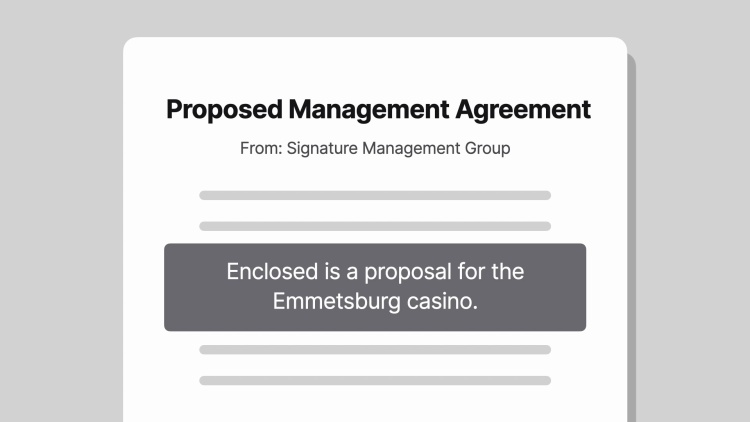Pavone v. Kirke
Iowa Supreme Court
807 N.W.2d 828 (2011)

- Written by Sean Carroll, JD
Facts
John Pavone and Signature Management Group (SMG) (plaintiffs) signed a contract with Gerald Kirke and Wild Rose Entertainment, LLC (defendants) (Wild Rose), under which Wild Rose agreed to negotiate in good faith with SMG for management services related to any future casino projects that Wild Rose had the opportunity to develop in Iowa. On May 11, 2005, the Iowa Racing and Gaming Commission (IRGC) gave Wild Rose a license to develop a casino in Emmetsburg. On May 24, Wild Rose sent SMG a letter stating that the parties’ contract terminated by its own terms effective May 11. The letter stated that the contract’s contingencies were not met. SMG contacted Wild Rose about the letter, and Wild Rose responded, stating that it would discuss a future relationship with Pavone, “if any,” internally, and that it was “still willing to work on finding common ground.” On July 12, 2005, SMG sent Wild Rose a proposed management agreement for the Emmetsburg project. Wild Rose did not respond to this outreach. On March 31, 2006, SMG brought a separate suit against Wild Rose, alleging that Wild Rose breached the contract. Subsequently, on June 8, 2006, the IRGC gave Wild Rose a license to develop a casino in Clinton. SMG brought this suit against Wild Rose, alleging that Wild Rose breached the contract with respect to the Clinton casino project. The trial court found that Wild Rose had repudiated the contract on May 11 and granted Wild Rose summary judgment based on the doctrine of claim preclusion. SMG appealed, arguing, among other things, that Wild Rose’s response about finding common ground retracted its repudiation.
Rule of Law
Issue
Holding and Reasoning (Wiggins, J.)
What to do next…
Here's why 899,000 law students have relied on our case briefs:
- Written by law professors and practitioners, not other law students. 47,000 briefs, keyed to 994 casebooks. Top-notch customer support.
- The right amount of information, includes the facts, issues, rule of law, holding and reasoning, and any concurrences and dissents.
- Access in your classes, works on your mobile and tablet. Massive library of related video lessons and high quality multiple-choice questions.
- Easy to use, uniform format for every case brief. Written in plain English, not in legalese. Our briefs summarize and simplify; they don’t just repeat the court’s language.






